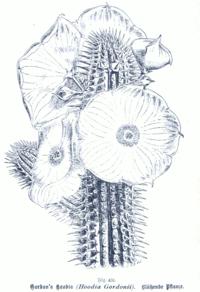
Hoodia (or Hoodia Gordonii) is a South African dwelling plant that the San bushman have used to help endure long hunting expeditiions for generations. Hoodia Gordonii is actually a succulent not to be confused with a cactus. It belongs in the succulent family of Asclepiadaceae along with stapelia, stephanotis and vinca. There are approximately 20 species in the genus of Asclepiadaceae. As it grows it forms stemmed clumps approximately one foot high and bears, pale purple saucer-shaped flowers in shades of red or purple brown. Hoodia Gordonii was discovered and used by the San tribe from the Kalahari, South Africa, since prehistoric times. They chewed the bitter Hoodia plant twice a day to suppress hunger and thirst during long hunting trips. This plant contains the miracle molecule p57 that was recently translated into a obesity cure. Hoodia pills are my life saver. I have a thyroid problem and this causes depression and weight gain. These pills take my hunger away so I can get back into shape and they make me happy, nice "side effect" ;-) Now my Doctor is taking them too! M S (Germany). Normally, to get your hypothalamus to turn off the hunger switch, you'd have to eat a moderate amount of food. And your hypothalamus isn't very quick on the draw either: it takes around 20 minutes to figure out what you've eaten, and by that time, you've probably eaten another 800 calories. So by the time your hunger signal gets turned off, you've already overeaten yet again. After years of careful research, scientists isolated several compounds in this all-natural food that was responsible for dramatic weight loss, P57, which has been widely reported, is but one of several chemical compounds found in the Hoodia succulent. Not only was it proven completely safe, it contains no stimulates that could contribute to the jittery feeling associated with weight loss products of the last decade.
full story
|

As much as 50 to 75 percent of obesity has genetic influences. Just what those genetic influences are that affect body weight have not been identified. During a binge, 10,000 to 20,000 calories can be consumed throughout the day. Binges usually consist of foods like cookies, candy, chips, ice cream and many other high calorie foods. Binges are often done in secret. After a binge, many of the feelings that caused the binge, like stress, may have subsided only to be replaced with feelings of guilt and lack of self-control. The following guidelines have been developed that may help control binge eating:
- Eat only at established meal times.
- Avoid keeping foods around that may trigger bingeing.
- Avoid fad or very restrictive diets.
- Keep a food diary and log to assess what prompted the binge.
full story
|

Sexual dysfunction or sexual malfunction is difficulty during any stage of the sexual act (which includes desire, arousal, orgasm, and resolution) that prevents the individual or couple from enjoying sexual activity. For both men and women, these conditions can manifest as an aversion to, and avoidance of, sexual contact with a partner. In men, there may be partial or complete failure to attain or maintain an erection, or a lack of sexual excitement and pleasure in sexual activity. Nerves must be working normally for a man to get and keep an erection. Nerve damage can result from diabetes, multiple sclerosis, prostate surgery or damage to the spinal cord. How long your erectile dysfunction lasts depends upon what causes it and how quickly your treatment starts to work. The important thing to remember is that erectile dysfunction is treatable in all age groups. If Sildenafil (Viagra), vardenafil (Levitra) and tadalafil (Cialis) drugs don't work or cannot be used because of potential side effects, your doctor can recommend other therapies. The drug alprostadil (Caverject, Edex, Muse) causes blood vessels to widen. This can allow blood to flow more freely in the penis, leading to an erection. The drug can be injected with a tiny needle, or a small pellet (suppository) can be inserted into the opening of the penis. Suppositories like this are effective in approximately two-thirds of men. Injections are effective about 80 percent of the time.
full story
|
Read our other articles:
|